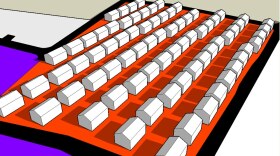As housing prices skyrocket, unemployment persists and wages are stagnant, housing security has become urgent. A federal judge last week struck down the CDC’s eviction moratorium. In New Mexico there are some local protections for renters, however, there are ways around those rules and many will soon expire. UNM law professor Serge Martinez talked to KUNM about working with law students and with the housing advocacy group Amparo to help Albuquerque’s most vulnerable people stay in their homes.
SERGE MARTINEZ: These are folks who are one financial hiccup away from financial disaster and one of the first places you feel that is in your housing situation. They are at risk every month of potentially not being able to make rent.
KUNM: What do your interventions look like?
MARTINEZ: If someone is able to get to us quickly enough, we're often able to step in and provide some legal defenses, at least represent them, and often work something out to slow down the actual eviction process so they can access resources or work out a graceful exit. But just to make sure that they are not railroaded by the system as much. Often we'll see people when it's past that point. In those cases, we do spend a lot of time trying to help folks recover security deposits that are withheld or reduced the amount of a judgment that's against them because they didn't owe X, Y or Z.
KUNM: I wonder if with these families in particular, if there are issues of race or gender at play.
MARTINEZ: Absolutely, it's a long standing systemic issue. Renters are disproportionately not white, because of historical patterns and policies that have made them less able to take advantage of programs that foster homeownership. Also, that's the part of our population that is more likely to have a low paying job or to be low income, and it's all concentrated in the rental world.
KUNM: I wonder about regulations that may be getting in the way of affordable housing. Is it fair to think government could approach the problem differently and get better outcomes?
MARTINEZ: Focusing on housing as something that we prioritize and value as a society is something that we really haven't done as much of as I think would be beneficial. For example, the Albuquerque Housing Authority doesn't have nearly enough of what are called Section Eight vouchers – vouchers to get people to be able to subsidize their housing. Fifty percent of the need is met, if that. Public housing is something that has been neglected. It has a really bad rap. We actually have public housing here in Albuquerque. Not a lot of people know it because it doesn't look like what they think it looks like, but there's a huge demand for public housing. We have fewer than 1000 units I believe here in Albuquerque. We also have things that are just keeping us from maximizing some of our housing possibilities. Zoning issues that prevent multifamily housing, that make it harder to put a Casita, or some sort of accessory dwelling on your property,
KUNM: How should we think about reinvesting in older neighborhoods when we also know that could drive up the rents?
MARTINEZ: I worry about gentrification, if we stick to the traditional notion of gentrification. If instead we say neighborhood revitalization is an important thing and we're going to support it and do it in a way that doesn't drive out the people who live there. We see better educational outcomes with better housing, we see better public health outcomes, personal health, mental health, behavioral health. Community development benefits from having a stable population and a stable community that can support local businesses and create political power that can address the needs of the folks who live there.
KUNM: Where should people go if they're getting in trouble?
MARTINEZ: The first call should be to their landlord, which it may be counterintuitive to some people but the landlord doesn't usually want to evict somebody. They would like to have a stable tenant who can pay the rent. Once you get evicted, it's harder to find a new place, you're not gonna have a few hundred dollars or $1,000 sitting around to pay a new security deposit. It sort of snowballs and can be catastrophic for families to be evicted. And the elements that cause you to be evicted in the first place are probably not going to disappear. We still have shockingly low wages in this country and New Mexico is no exception. You know it's important to recognize that most folks who are facing eviction for non payment of rent, it's not because they just woke up one day and decided "I don't feel like paying the rent." It's because they were put into an untenable situation having to choose between paying the rent and paying for their kid to go to the doctor, paying to fix their car so that they can go to work, paying for whatever other sorts of expenses show up in people's lives. It's reluctantly, and done often with shame, and with every intention of going to find that money as quickly as possible and get paid up, and often it just doesn't work out like that.






